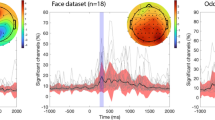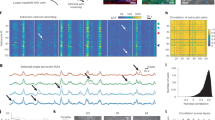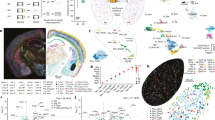Abstract
Our brains are constantly processing past events1. These offline processes consolidate memories, leading in the case of motor skill memories to an enhancement in performance between training sessions. A similar magnitude of enhancement develops over a night of sleep following an implicit task, in which a sequence of movements is acquired unintentionally, or following an explicit task, in which the same sequence is acquired intentionally2. What remains poorly understood, however, is whether these similar offline improvements are supported by similar circuits, or through distinct circuits. We set out to distinguish between these possibilities by applying transcranial magnetic stimulation over the primary motor cortex (M1) or the inferior parietal lobule (IPL) immediately after learning in either the explicit or implicit task. These brain areas have both been implicated in encoding aspects of a motor sequence and subsequently supporting offline improvements over sleep3–5. Here we show that offline improvements following the explicit task are dependent on a circuit that includes M1 but not IPL. In contrast, offline improvements following the implicit task are dependent on a circuit that includes IPL but not M1. Our work establishes the critical contribution made by M1 and IPL circuits to offline memory processing, and reveals that distinct circuits support similar offline improvements.
This is a preview of subscription content, access via your institution
Access options
Access Nature and 54 other Nature Portfolio journals
Get Nature+, our best-value online-access subscription
$29.99 / 30 days
cancel any time
Subscribe to this journal
Receive 12 digital issues and online access to articles
$119.00 per year
only $9.92 per issue
Buy this article
- Purchase on Springer Link
- Instant access to full article PDF
Prices may be subject to local taxes which are calculated during checkout



Similar content being viewed by others
References
Robertson, E. M. From creation to consolidation: a novel framework for memory processing. PLoS Biol. 7, e19 (2009).
Robertson, E. M., Pascual-Leone, A. & Press, D. Z. Awareness modifies the skill-learning benefits of sleep. Curr. Biol. 14, 208–212 (2004).
Grafton, S. T., Hazeltine, E. & Ivry, R. B. Abstract and effector-specific representations of motor sequences identified with PET. J. Neurosci. 18, 9420–9428 (1998).
Huber, R., Ghilardi, M. F., Massimini, M. & Tononi, G. Local sleep and learning. Nature 430, 78–81 (2004).
Ramanathan, D. S., Gulati, T. & Ganguly, K. Sleep-dependent reactivation of ensembles in motor cortex promotes skill consolidation. PLoS Biol. 13, e1002263 (2015).
Robertson, E. M., Pascual-Leone, A. & Miall, R. C. Current concepts in procedural consolidation. Nat. Rev. Neurosci. 5, 576–582 (2004).
Walker, M. P., Stickgold, R., Alsop, D., Gaab, N. & Schlaug, G. Sleep-dependent motor memory plasticity in the human brain. Neuroscience 133, 911–917 (2005).
Walker, M. P. A refined model of sleep and the time course of memory formation. Behav. Brain Sci. 28, 51–104 (2005).
Diekelmann, S. & Born, J. The memory function of sleep. Nat. Rev. Neurosci. 11, 114–126 (2010).
Hikosaka, O., Nakamura, K., Sakai, K. & Nakahara, H. Central mechanisms of motor skill learning. Curr. Opin. Neurobiol. 12, 217–222 (2002).
Dayan, E. & Cohen, L. G. Neuroplasticity subserving motor skill learning. Neuron 72, 443–454 (2011).
Albert, N. B., Robertson, E. M. & Miall, R. C. The resting human brain and motor learning. Curr. Biol. 19, 1023–1027 (2009).
Tambini, A., Ketz, N. & Davachi, L. Enhanced brain correlations during rest are related to memory for recent experiences. Neuron 65, 280–290 (2010).
Genzel, L. & Robertson, E. M. To replay, perchance to consolidate. PLoS Biol. 13, e1002285 (2015).
Nishida, M. & Walker, M. P. Daytime naps, motor memory consolidation and regionally specific sleep spindles. PloS One 2, e341 (2007).
Walker, M. P., Brakefield, T., Morgan, A., Hobson, J. A. & Stickgold, R. Practice with sleep makes perfect: sleep-dependent motor skill learning. Neuron 35, 205–211 (2002).
Fischer, S., Hallschmid, M., Elsner, A. L. & Born, J. Sleep forms memory for finger skills. Proc. Natl Acad. Sci. USA 99, 11987–11991 (2002).
Cohen, D. A., Pascual-Leone, A., Press, D. Z. & Robertson, E. M. Off-line learning of motor skill memory: a double dissociation of goal and movement. Proc. Natl Acad. Sci. USA 102, 18237–18241 (2005).
Press, D. Z., Casement, M. D., Pascual-Leone, A. & Robertson, E. M. The time course of off-line motor sequence learning. Brain Res. Cogn. Brain Res. 25, 375–378 (2005).
Cohen, D. A. & Robertson, E. M. Motor sequence consolidation: constrained by critical time windows or competing components. Exp. Brain Res. 177, 440–446 (2007).
Brown, R. M. & Robertson, E. M. Off-line processing: reciprocal interactions between declarative and procedural memories. J. Neurosci. 27, 10468–10475 (2007).
Spencer, R. M., Sunm, M. & Ivry, R. B. Sleep-dependent consolidation of contextual learning. Curr. Biol. 16, 1001–1005 (2006).
Galea, J. M., Albert, N. B., Ditye, T. & Miall, R. C. Disruption of the dorsolateral prefrontal cortex facilitates the consolidation of procedural skills. J. Cogn. Neurosci. 22, 1158–1164 (2010).
Cohen, D. A. & Robertson, E. M. Preventing interference between different memory tasks. Nat. Neurosci. 14, 953–955 (2011).
Mosha, N. & Robertson, E. M. Unstable memories create a high-level representation that enables learning transfer. Curr. Biol. 26, 100–105 (2016).
Robertson, E. M. New insights in human memory interference and consolidation. Curr. Biol. 22, R66–R71 (2012).
Chen, R. et al. Depression of motor cortex excitability by low-frequency transcranial magnetic stimulation. Neurology 48, 1398–1403 (1997).
Kosslyn, S. M. et al. The role of area 17 in visual imagery: convergent evidence from PET and rTMS. Science 284, 167–170 (1999).
Mottaghy, F. M., Gangitano, M., Sparing, R., Krause, B. J. & Pascual-Leone, A. Segregation of areas related to visual working memory in the prefrontal cortex revealed by rTMS. Cereb. Cortex 12, 369–375 (2002).
Robertson, E. M., Theoret, H. & Pascual-Leone, A. Studies in cognition: the problems solved and created by transcranial magnetic stimulation. J. Cogn. Neurosci. 15, 948–960 (2003).
Marshall, L., Molle, M., Hallschmid, M. & Born, J. Transcranial direct current stimulation during sleep improves declarative memory. J. Neurosci. 24, 9985–9992 (2004).
Marshall, L., Helgadottir, H., Molle, M. & Born, J. Boosting slow oscillations during sleep potentiates memory. Nature 444, 610–613 (2006).
Huber, R. et al. TMS-induced cortical potentiation during wakefulness locally increases slow wave activity during sleep. PLoS One 2, e276 (2007).
Hotermans, C., Peigneux, P., Maertens de Noordhout, A., Moonen, G. & Maquet, P. Early boost and slow consolidation in motor skill learning. Learn. Mem. 13, 580–583 (2006).
Hotermans, C., Peigneux, P., de Noordhout, A. M., Moonen, G. & Maquet, P. Repetitive transcranial magnetic stimulation over the primary motor cortex disrupts early boost but not delayed gains in performance in motor sequence learning. Eur. J. Neurosci. 28, 1216–1221 (2008).
Doyon, J. et al. Contribution of night and day sleep vs. simple passage of time to the consolidation of motor sequence and visuomotor adaptation learning. Exp. Brain Res. 195, 15–26 (2009).
Brown, R. M. & Robertson, E. M. Inducing motor skill improvements with a declarative task. Nat. Neurosci. 10, 148–149 (2007).
Tunovic, S., Press, D. Z. & Robertson, E. M. A physiological signal that prevents motor skill improvements during consolidation. J. Neurosci. 34, 5302–5310 (2014).
Breton, J. & Robertson, E. M. Flipping the switch: mechanisms that regulate memory consolidation. Trends Cogn. Sci. 18, 629–634 (2014).
Fischer, S., Nitschke, M. F., Melchert, U. H., Erdmann, C. & Born, J. Motor memory consolidation in sleep shapes more effective neuronal representations. J. Neuroscience 25, 11248–11255 (2005).
Friston, K. J. & Price, C. J. Degeneracy and redundancy in cognitive anatomy. Trends Cogn. Sci. 7, 151–152 (2003).
Walker, M. P. & Stickgold, R. Sleep-dependent learning and memory consolidation. Neuron 44, 121–133 (2004).
Oldfield, R. The assessment and analysis of handedness: the Edinburgh inventory. Neuropsychologia 9, 97–113 (1971).
Robertson, E. M., Press, D. Z. & Pascual-Leone, A. Off-line learning and the primary motor cortex. J. Neurosci. 25, 6372–6378 (2005).
Nissen, M. J. & Bullemer, P. Attentional requirements of learning: evidence from performance measures. Cogn. Psychol. 19, 1–32 (1987).
Robertson, E. M. The serial reaction time task: implicit motor skill learning? J. Neurosci. 27, 10073–10075 (2007).
Dominey, P. F., Lelekov, T., Ventre-Dominey, J. & Jeannerod, M. Dissociable processes for learning the surface structure and abstract structure of sensorimotor sequences. J. Cogn. Neurosci. 10, 734–751 (1998).
Willingham, D. B., Salidis, J. & Gabrieli, J. D. Direct comparison of neural systems mediating conscious and unconscious skill learning. J. Neurophysiol. 88, 1451–1460 (2002).
Hauptmann, B., Reinhart, E., Brandt, S. A. & Karni, A. The predictive value of the leveling off of within session performance for procedural memory consolidation. Brain Res. Cogn. Brain Res. 24, 181–189 (2005).
Wassermann, E. M. et al. Locating the motor cortex on the MRI with transcranial magnetic stimulation and PET. Neuroimage 3, 1–9 (1996).
Kammer, T., Beck, S., Thielscher, A., Laubis-Herrmann, U. & Topka, H. Motor thresholds in humans: a transcranial magnetic stimulation study comparing different pulse waveforms, current directions and stimulator types. Clin. Neurophysiol. 112, 250–258 (2001).
Silber, M. H. et al. The visual scoring of sleep in adults. J. Clin. Sleep Med. 3, 121–131 (2007).
Rechtschaffen, A. & Kales, A. Manual of Standardized Terminology, Techniques and Scoring Systems for Sleep Stages of Human Subjects (UCLA Brain Information Service, 1968).
Willingham, D. B., Nissen, M. J. & Bullemer, P. On the development of procedural knowledge. J. Exp. Psychol. Learn. Mem. Cogn. 15, 1047–1060 (1989).
Eysenck, H. J. & Frith, C. D. Reminiscence, Motivation, and Personality: A Case Study in Experimental Psychology (Plenum, 1977).
Boyd, L. A. & Winstein, C. J. Implicit motor-sequence learning in humans following unilateral stroke: the impact of practice and explicit knowledge. Neurosci. Lett. 298, 65–69 (2001).
Acknowledgements
We thank the National Science Foundation (Division of Behavioral and Cognitive Sciences, BCS, 0921177; E.M.R.) and the National Institutes of Health (R01 NS051446-03S1; E.M.R.) who funded this work. The funders had no role in study design, data collection and analysis, decision to publish or preparation of the manuscript. We also thank S. Tunovic for his assistance with many of the experiments, J. Saletin for helping with some aspects of the sleep analysis, and J. Mullington and M. Haack for helping with both the recording and scoring of participants’ sleep.
Author information
Authors and Affiliations
Contributions
J.B. performed the experiments and analysed the data. E.M.R designed the study, performed the experiments, analysed the data, interpreted the results and wrote the manuscript.
Corresponding author
Ethics declarations
Competing interests
The authors declare no competing interests.
Rights and permissions
About this article
Cite this article
Breton, J., Robertson, E. Dual enhancement mechanisms for overnight motor memory consolidation. Nat Hum Behav 1, 0111 (2017). https://doi.org/10.1038/s41562-017-0111
Received:
Accepted:
Published:
DOI: https://doi.org/10.1038/s41562-017-0111
This article is cited by
-
Early excitatory-inhibitory cortical modifications following skill learning are associated with motor memory consolidation and plasticity overnight
Nature Communications (2024)
-
Intention to learn modulates the impact of reward and punishment on sequence learning
Scientific Reports (2020)
-
Motor and spatial representations of action: corticospinal excitability in M1 after training with a bimanual skill
Experimental Brain Research (2020)
-
Static magnetic stimulation of the primary motor cortex impairs online but not offline motor sequence learning
Scientific Reports (2019)
-
Neuroscience: Sleep, memories, and the brain
Nature Human Behaviour (2017)



